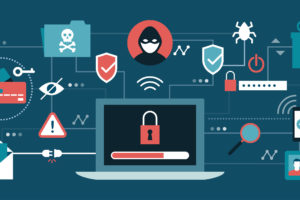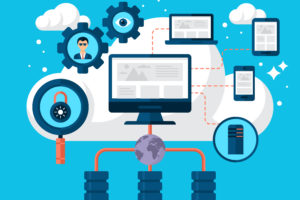Cyberattacks are a leading cause of lost revenue for small businesses.
From stealing company secrets, to pilfering your credit card information, hackers can make quick work of your private life through an unsecured device.
As our world becomes increasingly connected, there are more people who are looking to take advantage of your unsecured devices.
But protecting your computer from low-level hacking isn’t difficult. With just a few steps, you can prevent expensive cyberattacks — and increase your peace of mind.
1) Install an Antivirus
In the earlier days of the internet, you may have heard that antivirus companies ship their software with viruses. In doing so, they increase the need for their product, driving sales higher.
Most security experts disagree. Instead, they view anti-viruses as an important part of keeping your computer healthy.
While it may cost some money to install an anti-virus on all of your company’s computers, a good anti-virus can prevent cyberattacks, warn users when they venture into virus-laden parts of the internet, flag emails that include spam links, and more.
The best antivirus programs include Avast, Norton, and AVG. If these options don’t fit your business, there are hundreds of others to choose from.
And if you find the array of options hard to understand, consult an experienced IT professional.
2) Uninstall “Bloatware”
Have you noticed that every new device comes with programs pre-installed? Typically, these programs are installed by the company you purchased your device from. They may include games, news applications, or programs with names like “Software Assist.”
It turns out that this “bloatware” can have negative effects on your machine, like slowing it down or causing it to have more security vulnerabilities.
If you’re not going to use these programs, it’s best to uninstall and disable them as quickly as possible. You might be surprised by how much faster your device runs.
3) Use an Alternative Browser
If you’re still using Internet Explorer, or its updated version, Edge, your browsing may not be secure. Most cybersecurity experts recommend Google Chrome or Firefox for more secure browsing.
In particular, security buffs favor the Firefox add-on NoScript. NoScript prevents time-consuming website scripts from running — scripts that may lead to clickjacking or XSS attacks.
If you’re using Firefox, NoScript is a free, must-have tool in your security arsenal.
4) Enable Automatic Updates
We’ve all been there: you’re trying to leave the office on time, when your computer decides to update. While the updating process may be time consuming and, honestly, inconvenient, these updates are crucial to maintaining your system’s health.
Software updates allow programmers to patch exploits, bugs, and security concerns before they become major problems for most users. So, make sure to enable automatic updates for your operating system, your web browser, and your anti-virus software.
5) Activate your Firewall
If you own a Windows PC, your device comes pre-installed with a firewall. A firewall is a software program that prevents unwanted devices from connecting to your PC via the internet.
It will also alert you when you’re on suspicious pages on the internet, can help prevent spammers and unwanted contacts, and more.
Security Isn’t Difficult
Protecting your business from cyberattacks can seem overwhelming in the face of evolving hacking and phishing attacks. But with these steps, you’ll secure your device against the majority of low-lying threats.
Vodigy Networks is a trusted custom software provider to the St. Paul and Minneapolis area. We
specialize in providing expert guidance and assistance to businesses. If you
need help integrating software with your business, contact us today!

Todd Eldron
Todd Eldron is an accomplished information technology professional with over 15 years of experience guiding organizations through digital transformation initiatives. His work focuses on implementing effective strategies to enhance cybersecurity, optimize operational performance, and adopt emerging technologies responsibly.




